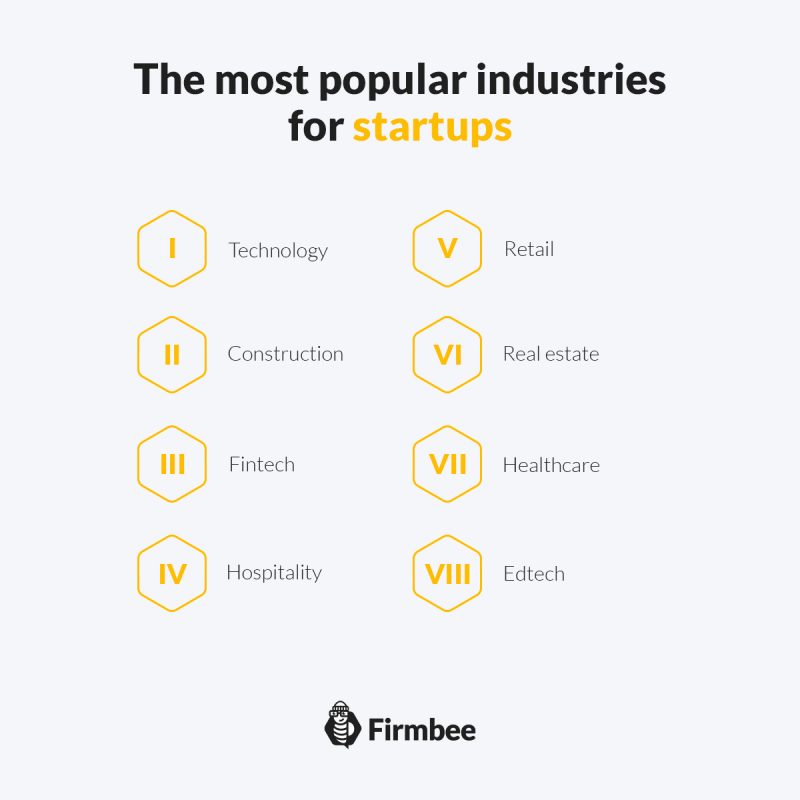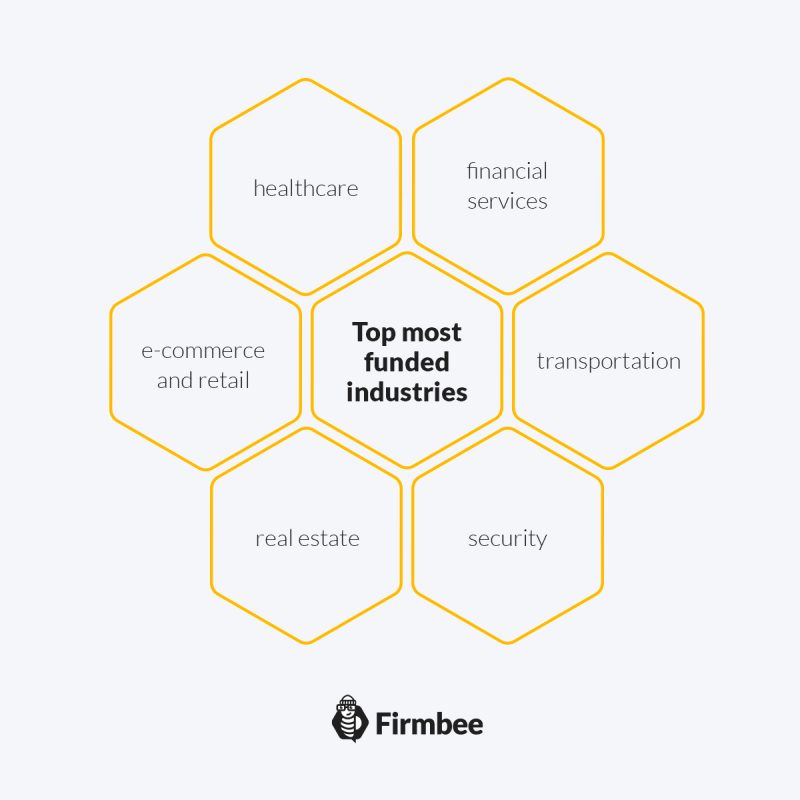Startups are frequently associated with online technology projects. In reality, however, they operate in various industries which are not closely related to IT. Where do startups dominate? Read our article and check out our list of top industries for startups.
Best industries for startups – table of contents:
8 best industries for startups
In some industries startups are created more often than in others since it is just more difficult to operate in certain markets on a larger scale. The popularity of startups in a given industry is also influenced by the fact that in some sectors it is quite easy to obtain funding, in others, it is almost impossible.
Analysts have calculated that in the USA alone, almost 430,000 startups are created every year, which gives approximately 1200 businesses a day, and 49 per hour. The figures are impressive. It turns out that the best industries for startups are as follows:
- Technology. Our list is topped by the technology sector. In the USA, about 20 technology companies are created each year, which then generate revenues of more than $100 million. The technology industry consists of companies that sell goods and services in electronics, software, computers, artificial intelligence. However, it is important to note that technology startups have the highest failure rate.
- Construction. Not many people associate startups with the construction industry.However, it turns out that there are a lot of them in this sector. What is more, such businesses receive over $580 million in funding each year. The construction industry is one of the least digitized, but studies show that the use of artificial intelligence increases profits in this sector by 71%.
- Fintech. The fintech industry, which refers to the use of technology to deliver financial services and products to consumers, has been a goldmine for investors in recent years. Fintech companies have revolutionized financial services. Currently, 80% of financial institutions use fintech solutions.
- Hospitality. Despite the Covid-19 pandemic, this is a sector with great opportunities for startups. There are hundreds of new and successful companies in this industry, and there are still many people who are willing to give catering and accommodation services a new dimension. Also, it is quite easy to obtain funding here.
- Retail. The vast range of companies thrive in this space. COVID-19 has put e-commerce at the forefront of retail. According to scientific data, global retail sales growth will continue to rise and take up more retail market share in the future.
- Real estate. Real estate startups, which additionally use artificial intelligence solutions, perform best in this sector. Startups in this industry receive up to $2 billion in funding annually.
- Healthcare. The COVID-19 outbreak has accelerated the growth of several startups in the medical sector. Modern medical devices have become a runaway hit in the world. All the indications are that healthcare will be a leading industry for startups in the coming years.
- Edtech. The edtech industry also owes its rapid growth to the epidemic, and it now plays a crucial role in the educational experience. As distance learning has become a new reality, a demand for online learning tools will continue to rise.


Top most funded industries
Investors are pouring money into promising young businesses from various industries. Here are the top 6 most funded sectors:
- healthcare
- financial services
- e-commerce and retail
- transportation
- real estate
- security
Best industries for startups – summary
Startups are formed in almost every industry. They are not always associated with new technologies and the Internet. However, tech and fintech startups are most likely to scale up rapidly, and have the highest potential to become successful.
Related post: Startup development. Also, check out our best project management software for marketing teams.
If you like our content, join our busy bees community on Facebook, Twitter, LinkedIn, Instagram, YouTube.
Author: Andy Nichols
A problem solver with 5 different degrees and endless reserves of motivation. This makes him a perfect Business Owner & Manager. When searching for employees and partners, openness and curiosity of the world are qualities he values the most.
Launch your startup:
- What is a startup?
- Pros and cons of creating a startup
- 8 best industries for startups
- Top 5 skills every highly successful startup founder needs
- How to create a startup? 7 simple and easy steps
- 6 essential startup development stages
- How to create a startup growth strategy?
- General startup statistics you need to know
- Startup vs. corporate job. Which is right for you?
- 5 incredible companies that started in a garage
- How to find a business idea?
- How to check if your startup idea already exists?
- How to name a startup? Useful tips and strategies
- How to gain business knowledge quickly? 5 best practices
- Why do startups fail? 6 startup ideas you should avoid
- 5 weird business ideas that made millions
- Top 6 most profitable small businesses
- 7 questions to determine if your business idea is worth pursuing
- What is a buyer persona? 5 benefits of creating a buyer persona
- How to validate your business idea? 3 easy steps
- Should you follow your passion? The importance of passion in business
- What is market reseach and why is it important?
- Using social media in business
- What to do when you have too many business ideas?
- How to write a good problem statement for your startup?
- How to test your business idea for real?
- How to create a prototype for a product?
- How to build an MVP?
- How to use surveys for testing your business idea?
- 10 useful tools to validate your business idea
- What is a business plan? 4 types of business plans
- What should be included in a business plan?
- What should a product description include?
- Competitor analysis
- Marketing strategy
- Traditional business plan vs. lean startup plan
- Implementation plan. What is it and how to create it?
- Everything you need to know about patents
- Financial management for startups
- What permits and licenses does my startup need?
- What is the average startup founder salary?
- 4 startup taxes you need to pay
- Which legal structure is best for your business?
- Startup costs. How much money will you need?
- Protection of intellectual property in a startup
- Family funding vs. self-funding
- What is a shareholders’ agreement?
- What should a financial section of a business plan include?


















